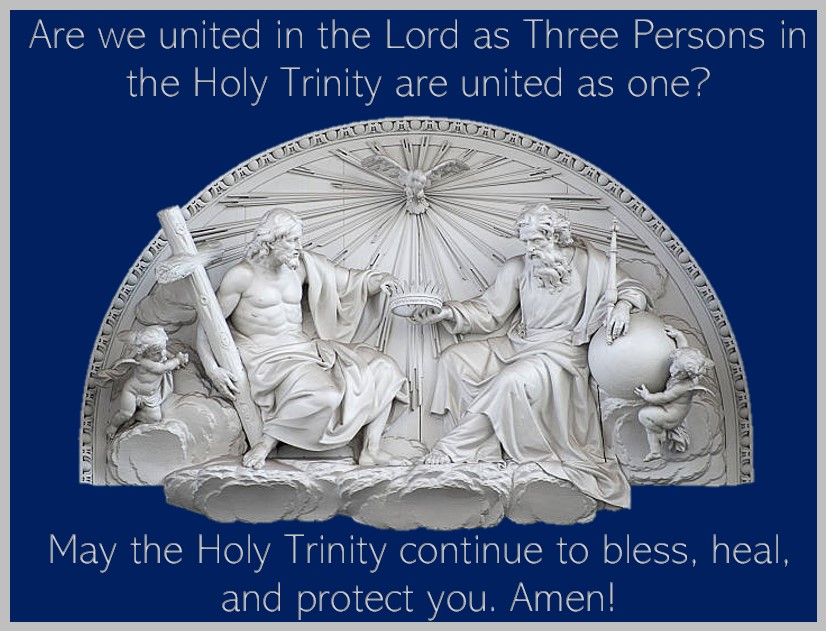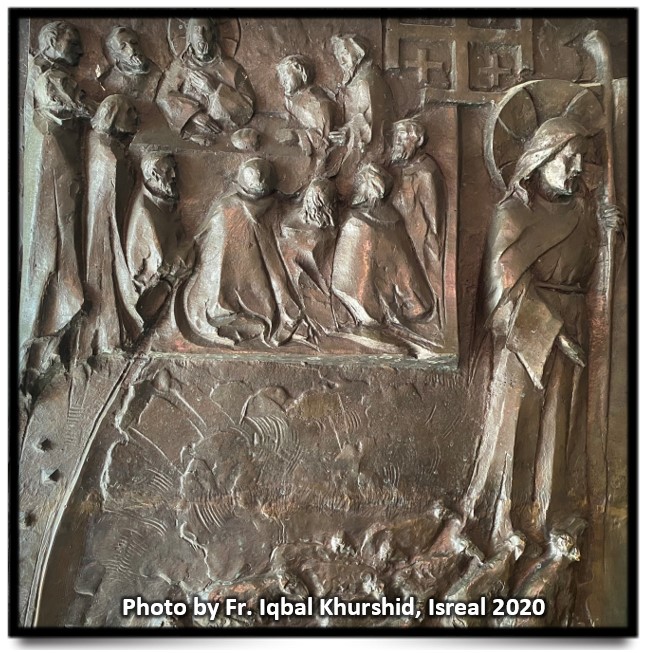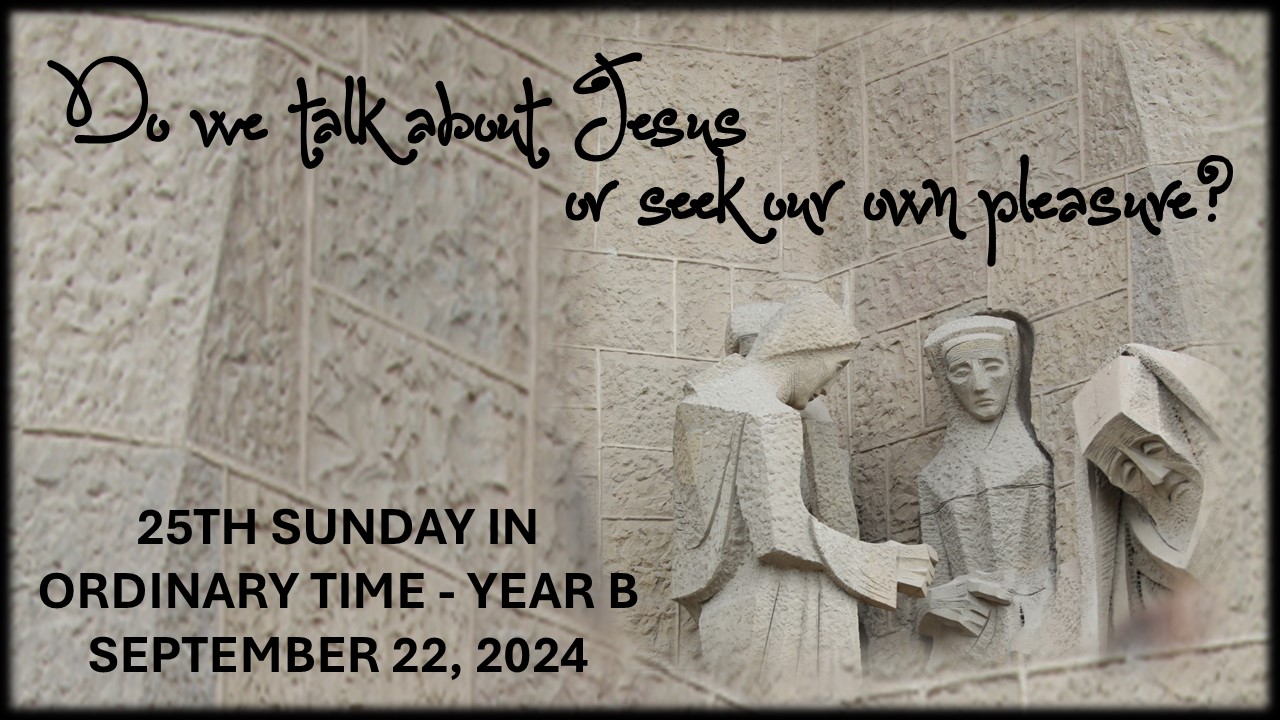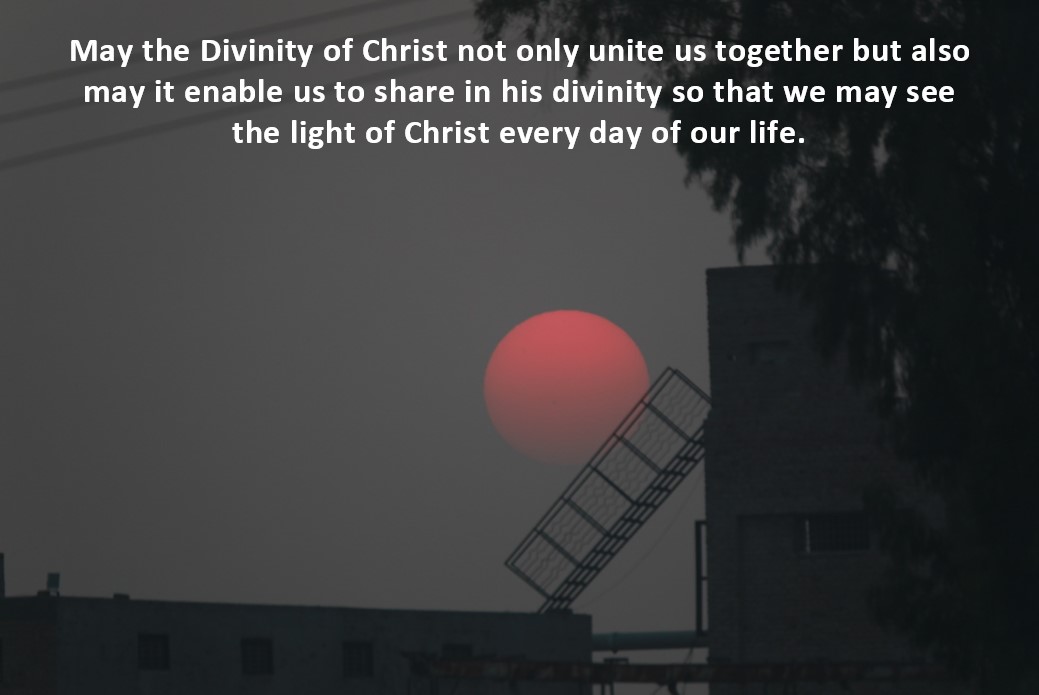
Solemnity of Holy Trinity Year A ~ June 4, 2023
UNITED WE STAND
Today as we celebrate the Solemnity of the Holy Trinity which is biggest dogma of our faith, without it our faith is not complete. Catechism of the Catholic has very profound teaching on the dogma of Holy Trinity. The paragraphs 232-260 of the Catechism of the Catholic Church speak about Holy Trinity; “Christians are baptized “in the name of the Father and of the Son and of the Holy Spirit” Before receiving the sacrament, they respond to a three-part question when asked to confess the Father, the Son and the Spirit: “I do.” “The faith of all Christians rests on the Trinity.” Christians are baptized in the name of the Father and of the Son and of the Holy Spirit: not in their names, for there is only one God, the almighty Father, his only Son and the Holy Spirit: the Most Holy Trinity. The mystery of the Most Holy Trinity is the central mystery of Christian faith and life. It is the mystery of God in himself. It is therefore the source of all the other mysteries of faith, the light that enlightens them. It is the most fundamental and essential teaching in the “hierarchy of the truths of faith”. The whole history of salvation is identical with the history of the way and the means by which the one true God, Father, Son and Holy Spirit, reveals himself to men “and reconciles and unites with himself those who turn away from sin”.
The Fathers of the Church distinguish between theology (theologia) and economy (oikonomia). “Theology” refers to the mystery of God’s inmost life within the Blessed Trinity and “economy” to all the works by which God reveals himself and communicates his life. Through the oikonomia the theologia is revealed to us; but conversely, the theologia illuminates the whole oikonomia. God’s works reveal who he is in himself; the mystery of his inmost being enlightens our understanding of all his works. So it is, analogously, among human persons. A person discloses himself in his actions, and the better we know a person, the better we understand his actions. The Trinity is a mystery of faith in the strict sense, one of the “mysteries that are hidden in God, which can never be known unless they are revealed by God”. To be sure, God has left traces of his Trinitarian being in his work of creation and in his Revelation throughout the Old Testament. But his inmost Being as Holy Trinity is a mystery that is inaccessible to reason alone or even to Israel’s faith before the Incarnation of God’s Son and the sending of the Holy Spirit”.
The Trinity is One. We do not confess three Gods, but one God in three persons, the “consubstantial Trinity”. The divine persons do not share the one divinity among themselves but each of them is God whole and entire: “The Father is that which the Son is, the Son that which the Father is, the Father and the Son that which the Holy Spirit is, i.e. by nature one God.”In the words of the Fourth Lateran Council (1215), “Each of the persons is that supreme reality, viz., the divine substance, essence or nature.” The divine persons are really distinct from one another. “God is one but not solitary.” “Father”, “Son”, “Holy Spirit” are not simply names designating modalities of the divine being, for they are really distinct from one another: “He is not the Father who is the Son, nor is the Son he who is the Father, nor is the Holy Spirit he who is the Father or the Son.” They are distinct from one another in their relations of origin: “It is the Father who generates, the Son who is begotten, and the Holy Spirit who proceeds.” The divine Unity is Triune.
The divine persons are relative to one another. Because it does not divide the divine unity, the real distinction of the persons from one another resides solely in the relationships which relate them to one another: “In the relational names of the persons the Father is related to the Son, the Son to the Father, and the Holy Spirit to both. While they are called three persons in view of their relations, we believe in one nature or substance.” Indeed “everything (in them) is one where there is no opposition of relationship.” “Because of that unity the Father is wholly in the Son and wholly in the Holy Spirit; the Son is wholly in the Father and wholly in the Holy Spirit; the Holy Spirit is wholly in the Father and wholly in the Son.”
St. Gregory of Nazianzus, also called “the Theologian”, entrusts this summary of Trinitarian faith to the catechumens of Constantinople: “Above all guard for me this great deposit of faith for which I live and fight, which I want to take with me as a companion, and which makes me bear all evils and despise all pleasures: I mean the profession of faith in the Father and the Son and the Holy Spirit. I entrust it to you today. By it I am soon going to plunge you into water and raise you up from it. I give it to you as the companion and patron of your whole life. I give you but one divinity and power, existing one in three, and containing the three in a distinct way. Divinity without disparity of substance or nature, without superior degree that raises up or inferior degree that casts down. . . the infinite co-naturality of three infinites. Each person considered in himself is entirely God. . . the three considered together. . . I have not even begun to think of unity when the Trinity bathes me in its splendor. I have not even begun to think of the Trinity when unity grasps me. . .”
Unity among the Three Persons of the Holy Trinity helps us to be united in the Lord because though different, we are one in the Lord and make our body of him as St. Paul says. (Please read Romans 12 & 1 Corinthians 10). Once we are united in the Holy Trinity, then, as St. Paul says, “no one can separate us from Christ” (Please read Romans 8).
The Holy Trinity gives us all the strength we need to be united with the Lord and it does require everyday, a struggle to keep the Lord the centre of our lives. Let me share a story with you.
A young girl and her father were walking along a forest path. At some point, they came across a large tree branch on the ground in front of them. The girl asked her father, “if I try, do you think I could move that branch?” Her father replied, “I am sure you can, if you use all your strength”. The girl tried here best to lift or push the branch, but she wasn’t strong enough and she couldn’t move it. She said, with disappointment, “You were wrong dad, I can’t move it”. “Try again with you all your strength”, replied to her father. Again, the girl tried hard to push the branch. She struggles but it did not move. “Dad, I can not do it”, said the girl. Finally, her father said” young lady, I advised you to use ‘all your strength’. You didn’t ask for my help”. The moral of the story is “No individual person has all the strength, all the resources and all the stamina required for the complete blossoming of their vision”. I do believe to be united with the Lord; we do need the help of Holy Trinity.
Pope Francis has explained beautifully the mystery of the Holy Trinity in these words: it leads us to contemplate and worship the divine life of the Father, the Son and the Holy Spirit: a life of communion and perfect love, origin and aim of all the universe and of every creature: God. We also recognize in the Trinity the model for the Church, in which we are called to love each other as Jesus loved us. And love is the concrete sign that demonstrates faith in God the Father, Son and Holy Spirit. And love is the badge of the Christian, as Jesus told us: “By this all men will know that you are my disciples, if you have love for one another” (Jn 13:35). It’s a contradiction to think of Christians who hate. It’s a contradiction. And the devil always seeks this: to make us hate, because he’s always a troublemaker; he doesn’t know love; God is love!
Living in an Islamic country I have noticed this dogma of our faith is always challenged by our non-Christian brethren that “How is it possible to worship three gods at the same time”? Are we (Christian) not committing blaspheming by making Jesus and Holy Spirit equal to God whereas God is only One? Do we worship three God(s) or only One? My answer to the above questions is we believe and worship only One God and in him there are three persons: God the Father, God the Son, and God the Holy Spirit. Their unity and love are beyond comparison. Holy Father
Pope Francis explains this impossibility in an amazing way “The Father is the beginning, the Father who created all things, who created us. What did Jesus do on earth? He saved us! And Jesus came to give his life for us. The Father creates the world; Jesus saves us. And what does the Holy Spirit do? He loves us! The Father creates all, he creates the world; Jesus saves us; and the Holy Spirit? He loves us! And this is Christian life: talking to the Father, talking to the Son, and talking to the Holy Spirit. Jesus has saved us, but he also walks beside us in life”.
Saint Athanasius explains the mystery of Holy Trinity in these words: “Light, radiance and grace are in the Trinity and from the Trinity” It will not be out of place to consider the ancient tradition, teaching and faith of the Catholic Church, which was revealed by the Lord, proclaimed by the apostles and guarded by the fathers. For upon this faith the Church is built, and if anyone were to lapse from it, he would no longer be a Christian either in fact or in name. We acknowledge the Trinity, holy and perfect, to consist of the Father, the Son and the Holy Spirit. In this Trinity there is no intrusion of any alien element or of anything from outside, nor is the Trinity a blend of creative and created being. It is a wholly creative and energizing reality, self-consistent and undivided in its active power, for the Father makes all things through the Word and in the Holy Spirit, and in this way the unity of the holy Trinity is preserved. Accordingly, in the Church, one God is preached, one God who is above all things and through all things and in all things. God is above all things as Father, for he is principle and source; he is through all things through the Word; and he is in all things in the Holy Spirit. Writing to the Corinthians about spiritual matters, Paul traces all reality back to one God, the Father, saying: Now there are varieties of gifts, but the same Spirit; and varieties of service, but the same Lord; and there are varieties of working, but it is the same God who inspires them all in everyone.
The unity of the Holy Trinity does help to understand everything clearly and without doubt because once we have developed the attitude of positivity, then everything we look at is completely different and genuine. The following may help us to understand that why do we need to have positive attitude toward everything and everyone.
A daughter is telling her mother how everything is going wrong. She’s failing algebra, her boyfriend broke up with her, and her best friend is moving away. Meanwhile, her mother is baking a cake and asks her daughter if she would like a snack. The daughter says, “Absolutely Mom, I love your cake.” “Here, have some cooking oil,” her mother offers. “Yuck” says her daughter. “How about a couple raw eggs?” “Gross, Mom!” “Would you like some flour then? Or maybe baking soda?” “Mom, those are all yucky!” To which the mother replies, “Yes, all those things seem bad all by themselves, but when they are put together in the right way, they make a wonderfully delicious cake! God works the same way.
According to the Didache (ca. 100 a.d.) liturgically the mention of the Name of each of the Three Persons of the Trinity is essential for a baptism to be valid. After the foregoing instructions, baptize in the name of the Father, and of the Son, and of the Holy Spirit, in living “running” water. . .. If you have neither, pour water three times on the head, in the name of the Father, and of the Son, and of the Holy Spirit (Didache 7:1 ‘A.D. 70’). Personally, speaking this text powerfully reminds me of what we find written in the Catechism itself on this subject: Christians are baptized in the name of the Father and of the Son and of the Holy Spirit: not in their names, for there is only one God, the almighty Father, his only Son and the Holy Spirit: the Most Holy Trinity (no.233).
In St. Ignatius of Antioch (+110) the Trinity emerges in his greeting, which is also an affirmation of the one faith of the early Church in the triune God, as his letter to the Ephesians attests. Within the same letter we furthermore encounter the explicit belief of Christ’s incarnation in the holy womb of Mary. “To the Church at Ephesus in Asia . . . chosen through true suffering by the will of the Father in Jesus Christ our God” (Letter to the Ephesians 1 A.D. 110). “For our God, Jesus Christ, was conceived by Mary in accord with God’s plan: of the seed of David, it is true, but also of the Holy Spirit” (ibid., 18:2).
With Justin the Martyr (+165 AD) again we have the belief in the Trinity which is being manifested within the liturgical assembly. “We will prove that we worship him reasonably; for we have learned that he is the Son of the true God himself, that he holds a second place, and the Spirit of prophecy a third. For this they accuse us of madness, saying that we attribute to a crucified man a place second to the unchangeable and eternal God, the Creator of all things; but they are ignorant of the mystery which lies therein”. In other words, as we worship, so we believe, so we live.
For Theophilus of Antioch (+185) the Trinity is likened to the three days before the luminaries were created. “It is the attribute of God, of the most high and almighty and of the living God, not only to be everywhere, but also to see and hear all; for he can in no way be contained in a place. The three days before the luminaries were created are types of the Trinity: God, his Word, and his Wisdom”. While St. Irenaeus, deeply embedded in an ecclesiological context, can easily affirm the very faith of the Church of the Trinity, a Church, of course, which is in every corner of the globe! It is in her belief in the Trinity that the Church is one! “For the Church, although dispersed throughout the whole world even to the ends of the earth, has received from the apostles and from their disciples the faith in one God, the Father Almighty . . . and in one Jesus Christ, the Son of God, who became flesh for our salvation; and in the Holy Spirit”.
The ecclesiastical writer of the third century St. Tertullian (+220) helps us notice the affirmation of the One God as well as the monarchy of the Father, from whom sprouts the existence of the two other trinitarian Persons, the Son and the Holy Spirit. “We do indeed believe that there is only one God, but we believe that under this dispensation, or, as we say, oikonomia, there is also a Son of this one only God, his Word, who proceeded from him and through whom all things were made and without whom nothing was made. We believe he was sent down by the Father, in accord with his own promise, the Holy Spirit, the Paraclete, the sanctifier of the faith of those who believe in the Father and the Son, and in the Holy Spirit”.
Are we united in the Lord as Three Persons in the Holy Trinity are united as one? May the Holy Trinity continue to bless, heal, and protect you. Amen!
Other Sermons In This Series

28th Sunday in Ordinary Time Year C – October 9, 2022
October 07, 2022

25TH SUNDAY IN ORDINARY TIME, YEAR B ~ SEPTEMBER 22, 2024
September 19, 2024

3rd Sunday in Ordinary Time Year A ~ January 22, 2023
January 20, 2023

